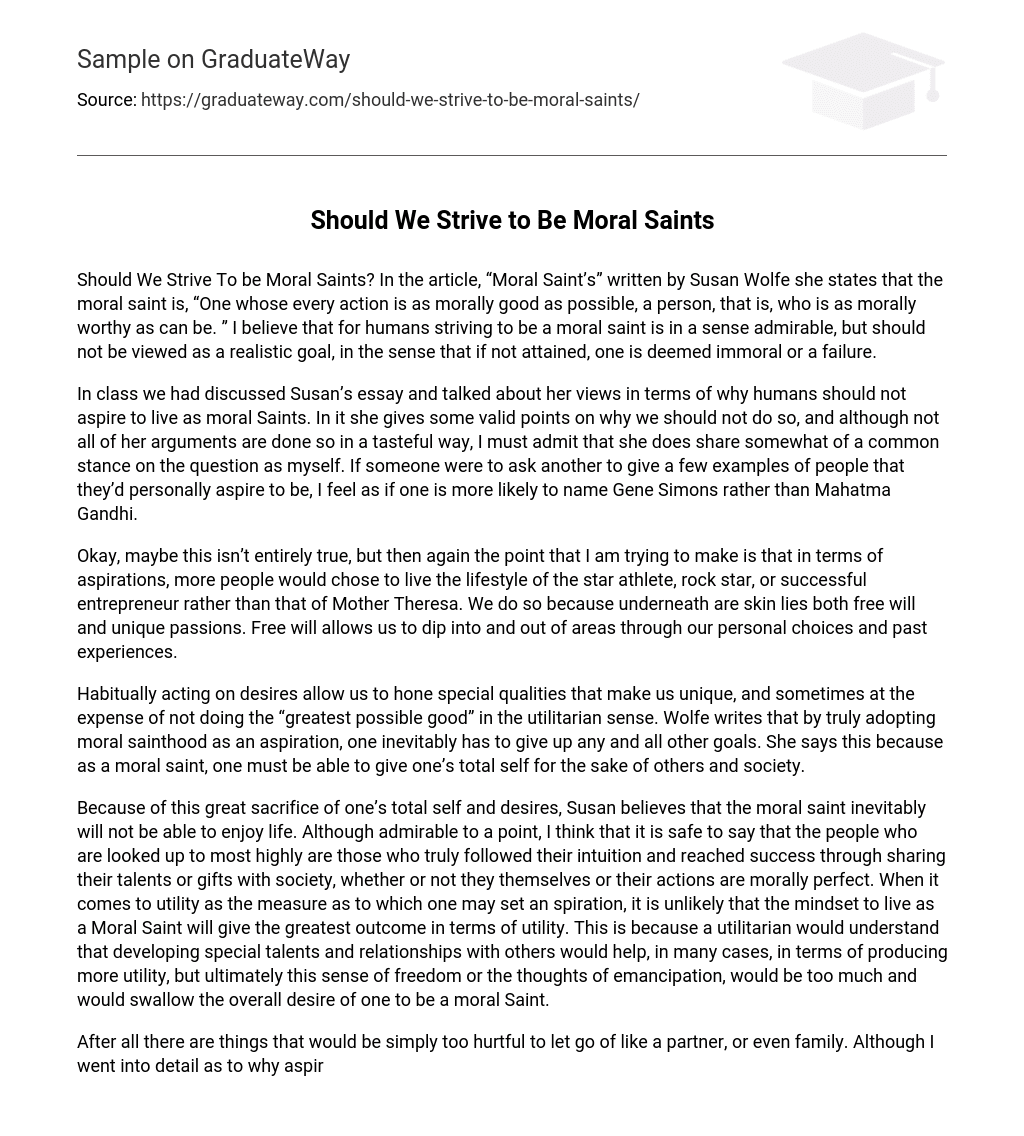Should We Strive To be Moral Saints? In the article, “Moral Saint’s” written by Susan Wolfe she states that the moral saint is, “One whose every action is as morally good as possible, a person, that is, who is as morally worthy as can be. ” I believe that for humans striving to be a moral saint is in a sense admirable, but should not be viewed as a realistic goal, in the sense that if not attained, one is deemed immoral or a failure.
In class we had discussed Susan’s essay and talked about her views in terms of why humans should not aspire to live as moral Saints. In it she gives some valid points on why we should not do so, and although not all of her arguments are done so in a tasteful way, I must admit that she does share somewhat of a common stance on the question as myself. If someone were to ask another to give a few examples of people that they’d personally aspire to be, I feel as if one is more likely to name Gene Simons rather than Mahatma Gandhi.
Okay, maybe this isn’t entirely true, but then again the point that I am trying to make is that in terms of aspirations, more people would chose to live the lifestyle of the star athlete, rock star, or successful entrepreneur rather than that of Mother Theresa. We do so because underneath are skin lies both free will and unique passions. Free will allows us to dip into and out of areas through our personal choices and past experiences.
Habitually acting on desires allow us to hone special qualities that make us unique, and sometimes at the expense of not doing the “greatest possible good” in the utilitarian sense. Wolfe writes that by truly adopting moral sainthood as an aspiration, one inevitably has to give up any and all other goals. She says this because as a moral saint, one must be able to give one’s total self for the sake of others and society.
Because of this great sacrifice of one’s total self and desires, Susan believes that the moral saint inevitably will not be able to enjoy life. Although admirable to a point, I think that it is safe to say that the people who are looked up to most highly are those who truly followed their intuition and reached success through sharing their talents or gifts with society, whether or not they themselves or their actions are morally perfect. When it comes to utility as the measure as to which one may set an spiration, it is unlikely that the mindset to live as a Moral Saint will give the greatest outcome in terms of utility. This is because a utilitarian would understand that developing special talents and relationships with others would help, in many cases, in terms of producing more utility, but ultimately this sense of freedom or the thoughts of emancipation, would be too much and would swallow the overall desire of one to be a moral Saint.
After all there are things that would be simply too hurtful to let go of like a partner, or even family. Although I went into detail as to why aspiring to be a moral Saint is not something for me, I do feel that those who choose to live life in that way or even admit to feeling it is correct in aspiring towards should not be bashed.
Although I did find Susan’s essay fascinating and easy to relate with, I did feel that she should really keep the mocking of others out of her texts One interesting note I wanted to put into this essay was the fact that although being a moral saint is considered unattainable or unrealistic, I believe that those who choose to be more idealistic when it comes to goals or hopes are those who often succeed the most. An example is when shooting free throws.
For anyone that plays basketball, nobody will tell you that they go up to the free throw line and aspire to make half of their free-throws simply because it’s realistic or because it will in the end make them happier because they then can focus on more important aspects of life. If you asked Michael Jordan, I’m sure he’d say he aims to make every shot he takes. Even if he doesn’t make them all, what is important is the relentless mindset to constantly improve by having high goals. I think in terms of being a moral person this way of thinking can be extraordinarily beneficial to the moral choices one habitually makes and the welfare of others.
I do not feel that striving toward moral sainthood is necessarily idiotic or undesirable because I think more times than not the mindset alone will aid in improving one’s life along with the lives of others so long as other goals and values are also made as well. That being said I’ll end on a quote that helps paint a picture of this way of thinking positively , “Aim for the moon, for even if you miss, you will land amongst the stars. ” Works Cited Cahn, Steven M. , and Peter J. Markie. Ethics: History, Theory, and Contemporary Issues. New York: Oxford UP, 2012. Print.





